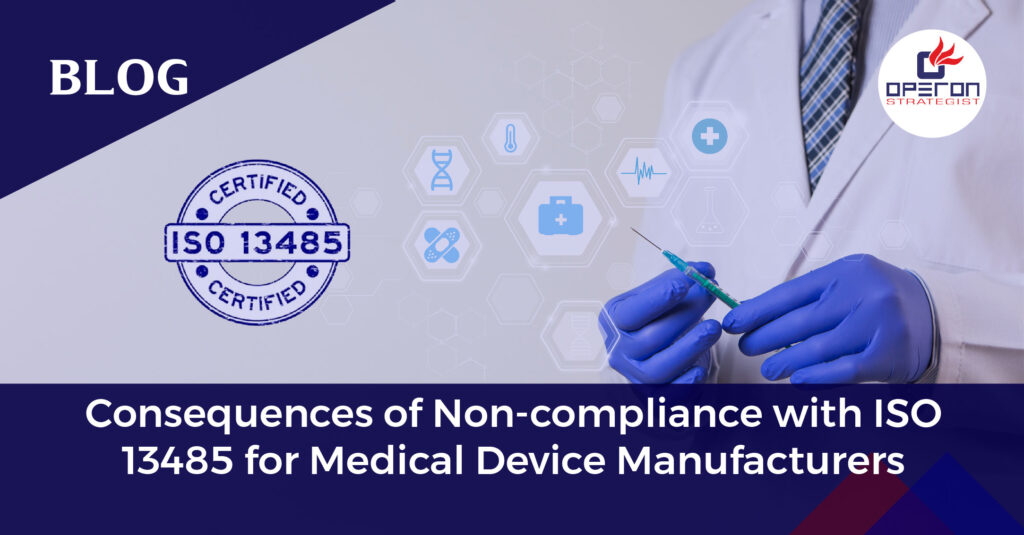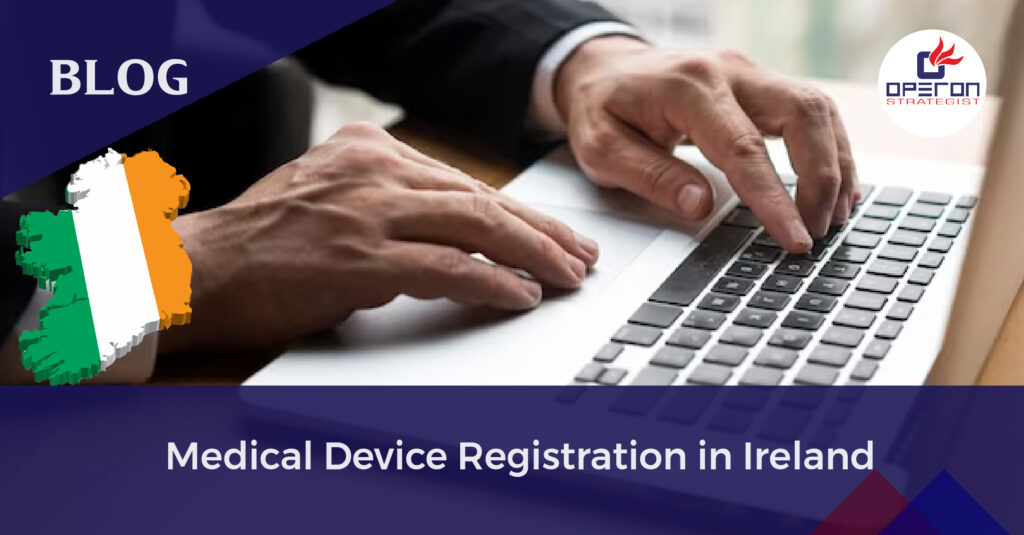ISO 13485:2016 Quality Management System
ISO 13485:2016 is the standard for a Quality Management System (“QMS”) for the design and manufacture of Medical Devices. While ISO 13485:2016 remains a stand-alone document, it aligns with ISO 9001:2008.
ISO 13485 evaluates whether your Quality Management System is appropriate and effective while emphasizing the safety and efficacy of medical devices.
ISO 13485:2016 specifies requirements for a Quality Management System where an organization needs to demonstrate its ability to provide medical devices and related services that consistently meet customer and applicable regulatory requirements. Such organizations can be involved in one or more stages of the life-cycle, including design and development, production, storage and distribution, installation, or servicing of a medical device and design and development or provision of associated activities (e.g., technical support). ISO 13485:2016 can also be used by suppliers or external parties that provide product, including quality management system-related services to such organizations.
Requirements of ISO 13485:2016 are applicable to organizations regardless of their size and regardless of their type except where explicitly stated. Wherever requirements are specified as applying to medical devices, the requirements apply equally to associated services as supplied by the organization.
ISO 13485 certificate is designed to be used by organizations throughout the life cycle of a medical device, from initial conception to production and post-production, including final decommission and disposal. It also covers aspects such as storage, distribution, installation and servicing, and the provision of associated services. Thus, every manufacturer must comply with the ISO 13485 along with Quality Management System or their country-specific QMS standard. Non-compliance with Quality Management System (QMS) can create many problems, which may lead to fines, penalties, delays in marketing products, etc.
What is a Medical Device?
A medical device is a product, such as an instrument, machine, implant or in vitro reagent, that is intended for use in the diagnosis, prevention and treatment of diseases or other medical conditions.
Who can Apply for ISO 13485 Certificate?
ISO 13485 is designed to be used by organizations involved in the design, production, installation and servicing of medical devices and related services. It can also be used by internal and external parties, such as certification bodies, to help them with their auditing processes.
What is a Quality Management System?
A quality management system (QMS) is a set of policies, processes and procedures that help an organization meet the requirements expected by its stakeholders. It is based on the Plan-Do-Check-Act cycle, a four-step management method used in business for the control and continual improvement of processes and products.
What Benefits Will it Bring to my Organization?
Safety and performance of medical devices are paramount in this highly regulated industry; this is why Quality Management Systems are a regulatory or legal requirement in many countries. ISO 13485 can help organizations involved in any part of a medical device’s life cycle.
Consequences of Non-Compliance with ISO 13485 for Medical Device Manufacturers:
Failing to meet all guidelines for compliance can result in serious consequences for your business. It can also alter your company’s legal status, leaving you vulnerable to lawsuits, government agencies audits, fines or even having your business dissolved entirely.
Compliance with Legal Requirements
Because of the vast number of government guidelines for compliance. Having a complete and thorough understanding of compliance requirements is crucial to protecting your business in the years to come.
- Complaints – 21 CFR 820.198
- CAPAs – 21 CFR 820.100
- Control of nonconforming product – 21 CFR 820.90
- Process Validation – 21 CFR 820.75
- Design Control, Specifically Design verification and validation – 21 CFR 820.30 (f) & (g)
Requirements of the standard: ISO 13485 states many standards in the form of Mandatory Documents: Below is the list of mandatory documents required during the ISO 13485 audit. Although all the documents are necessary manufacturer needs to pay attention to some of these mentioned documents:
Sr.no | Document | Corresponding clause | Description |
1 | Quality Manual | 4.2.3 | It mainly outlines organizations’ QMS. |
2 | Standard operating procedure | 7.5 | It includes detailed instructions to perform QMS-specified processes. |
3 | Instructions of work | 7.5 | It includes the step-by-step process of the tasks that need to be performed. |
4 | Forms and templates | 7.5.1 | Documents are used to capture data and information related to the QMS. |
5 | Quality records | 7.5.6 | Documents of the test results, training, and complaint records. |
6 | Risk management documents | 6.1 | It consists of all the documents related to risk management. |
7 | Validation documents | 7.3 | Documents related to the validation of processes, devices, and systems.
|
8 | Calibration records | 7.6 | Documentation on calibration, schedules, and reports. |
9 | Nonconformance records | 8.3 | Corrective and preventive actions record |
10 | Audit records | 9.2 | Internal and external audit documents |
Make ISO 13485 Certification simple and full proof by associating with Operon Strategist. Contact us on WhatsApp/call +919370283428
How Operon Strategist Will Help You?
Operon Strategist is a medical device regulatory consultant, and our technical professionals have first-hand knowledge and in-depth expertise with all types of medical devices regulatory certificates. In addition, our global presence in 32 countries including management systems applicable in the manufacture of medical devices. Operon team consists of experts with the skills and expertise needed to accurately assess the compliance of your management system, Finally, our on-site or off-site Technical Documentation Assessment will provide you with the information you need to understand your exposure to non-compliance issues. This unique combination of experience makes Operon Strategist ideally suited to address the needs of medical device manufacturers seeking to achieve or maintain ISO 13485 certification. Experience seamless market expansion and regulatory compliance with our top-tier MDSAP consulting services.
- Operon Strategist
- Operon Strategist
- Operon Strategist
- Operon Strategist
- Operon Strategist
- Operon Strategist
- Operon Strategist
- Operon Strategist
- Operon Strategist
- Operon Strategist
- Operon Strategist
- Operon Strategist
- Operon Strategist
- Operon Strategist
- Operon Strategist
- Operon Strategist
- Operon Strategist
- Operon Strategist
- Operon Strategist
- Operon Strategist
- Operon Strategist
- Operon Strategist
- Operon Strategist
- Operon Strategist
- Operon Strategist
- Operon Strategist
- Operon Strategist
- Operon Strategist
- Operon Strategist
- Operon Strategist
- Operon Strategist
- Operon Strategist
- Operon Strategist
- Operon Strategist
- Operon Strategist
- Operon Strategist
- Operon Strategist
- Operon Strategist
- Operon Strategist
- Operon Strategist
- Operon Strategist
- Operon Strategist
- Operon Strategist
- Operon Strategist
- Operon Strategist
- Operon Strategist
- Operon Strategist
- Operon Strategist
- Operon Strategist
- Operon Strategist
- Operon Strategist
- Operon Strategist
- Operon Strategist
- Operon Strategist
- Operon Strategist
- Operon Strategist
- Operon Strategist
- Operon Strategist
- Operon Strategist
- Operon Strategist
- Operon Strategist
- Operon Strategist
- Operon Strategist
- Operon Strategist
- Operon Strategist
- Operon Strategist
- Operon Strategist
- Operon Strategist
- Operon Strategist
- Operon Strategist
- Operon Strategist
- Operon Strategist
- Operon Strategist
- Operon Strategist
- Operon Strategist
- Operon Strategist
- Operon Strategist
- Operon Strategist
- Operon Strategist
- Operon Strategist
- Operon Strategist
- Operon Strategist
- Operon Strategist
- Operon Strategist
- Operon Strategist
- Operon Strategist
- Operon Strategist
- Operon Strategist
- Operon Strategist
- Operon Strategist
- Operon Strategist
- Operon Strategist
- Operon Strategist
- Operon Strategist
- Operon Strategist
- Operon Strategist
- Operon Strategist
- Operon Strategist
- Operon Strategist
- Operon Strategist
- Operon Strategist
- Operon Strategist
- Operon Strategist
- Operon Strategist
- Operon Strategist
- Operon Strategist
- Operon Strategist
- Operon Strategist
- Operon Strategist
- Operon Strategist
- Operon Strategist
- Operon Strategist
- Operon Strategist
- Operon Strategist
- Operon Strategist
- Operon Strategist
- Operon Strategist
- Operon Strategist
- Operon Strategist
- Operon Strategist
- Operon Strategist
- Operon Strategist
- Operon Strategist
- Operon Strategist
- Operon Strategist
- Operon Strategist
- Operon Strategist
- Operon Strategist
- Operon Strategist
- Operon Strategist
- Operon Strategist
- Operon Strategist
- Operon Strategist
- Operon Strategist
- Operon Strategist
- Operon Strategist
- Operon Strategist
- Operon Strategist
- Operon Strategist
- Operon Strategist
- Operon Strategist
- Operon Strategist
- Operon Strategist
- Operon Strategist
- Operon Strategist
- Operon Strategist
- Operon Strategist
- Operon Strategist
- Operon Strategist
- Operon Strategist
- Operon Strategist
- Operon Strategist
- Operon Strategist
- Operon Strategist
- Operon Strategist
- Operon Strategist
- Operon Strategist
- Operon Strategist
- Operon Strategist
- Operon Strategist
- Operon Strategist
- Operon Strategist
- Operon Strategist
- Operon Strategist
- Operon Strategist
- Operon Strategist
- Operon Strategist
- Operon Strategist
- Operon Strategist
- Operon Strategist
- Operon Strategist
- Operon Strategist
- Operon Strategist
- Operon Strategist
- Operon Strategist
- Operon Strategist
- Operon Strategist
- Operon Strategist
- Operon Strategist
- Operon Strategist
- Operon Strategist
- Operon Strategist
- Operon Strategist
- Operon Strategist
- Operon Strategist
- Operon Strategist
- Operon Strategist
- Operon Strategist
- Operon Strategist
- Operon Strategist
- Operon Strategist
- Operon Strategist
- Operon Strategist
- Operon Strategist
- Operon Strategist
- Operon Strategist
- Operon Strategist
- Operon Strategist
- Operon Strategist
- Operon Strategist
- Operon Strategist
- Operon Strategist
- Operon Strategist
- Operon Strategist
- Operon Strategist
- Operon Strategist
- Operon Strategist
- Operon Strategist
- Operon Strategist
- Operon Strategist
- Operon Strategist
- Operon Strategist
- Operon Strategist
- Operon Strategist
- Operon Strategist
- Operon Strategist
- Operon Strategist
- Operon Strategist
- Operon Strategist
- Operon Strategist
- Operon Strategist
- Operon Strategist
- Operon Strategist
- Operon Strategist
- Operon Strategist
- Operon Strategist
- Operon Strategist
- Operon Strategist
- Operon Strategist
- Operon Strategist
- Operon Strategist
- Operon Strategist
- Operon Strategist
- Operon Strategist
- Operon Strategist
- Operon Strategist
- Operon Strategist
- Operon Strategist
- Operon Strategist
- Operon Strategist
- Operon Strategist
- Operon Strategist
- Operon Strategist
- Operon Strategist
- Operon Strategist
- Operon Strategist
- Operon Strategist
- Operon Strategist
- Operon Strategist
- Operon Strategist
- Operon Strategist
- Operon Strategist
- Operon Strategist
- Operon Strategist
- Operon Strategist
- Operon Strategist
- Operon Strategist
- Operon Strategist
- Operon Strategist
- Operon Strategist
- Operon Strategist
- Operon Strategist
- Operon Strategist
- Operon Strategist
- Operon Strategist
- Operon Strategist
- Operon Strategist
- Operon Strategist
- Operon Strategist
- Operon Strategist
- Operon Strategist
- Operon Strategist
- Operon Strategist
- Operon Strategist
- Operon Strategist
- Operon Strategist
- Operon Strategist
- Operon Strategist
- Operon Strategist
- Operon Strategist
- Operon Strategist
- Operon Strategist
- Operon Strategist
- Operon Strategist
- Operon Strategist
- Operon Strategist
- Operon Strategist
- Operon Strategist
- Operon Strategist
- Operon Strategist
- Operon Strategist
- Operon Strategist
- Operon Strategist
- Operon Strategist
- Operon Strategist
- Operon Strategist
- Operon Strategist
- Operon Strategist
- Operon Strategist
- Operon Strategist
- Operon Strategist
- Operon Strategist
- Operon Strategist
- Operon Strategist
- Operon Strategist
- Operon Strategist
- Operon Strategist
- Operon Strategist
- Operon Strategist
- Operon Strategist
- Operon Strategist
- Operon Strategist
- Operon Strategist
- Operon Strategist
- Operon Strategist
- Operon Strategist
- Operon Strategist
- Operon Strategist
- Operon Strategist
- Operon Strategist
- Operon Strategist
- Operon Strategist
- Operon Strategist
- Operon Strategist
- Operon Strategist
- Operon Strategist
- Operon Strategist
- Operon Strategist
- Operon Strategist
- Operon Strategist
- Operon Strategist
- Operon Strategist
- Operon Strategist
- Operon Strategist
- Operon Strategist
- Operon Strategist
- Operon Strategist
- Operon Strategist
- Operon Strategist
- Operon Strategist
- Operon Strategist
- Operon Strategist
- Operon Strategist
- Operon Strategist
- Operon Strategist
- Operon Strategist
- Operon Strategist
- Operon Strategist
- Operon Strategist
- Operon Strategist
- Operon Strategist
- Operon Strategist
- Operon Strategist
- Operon Strategist
- Operon Strategist
- Operon Strategist
- Operon Strategist
- Operon Strategist
- Operon Strategist
- Operon Strategist
- Operon Strategist
- Operon Strategist
- Operon Strategist
- Operon Strategist
- Operon Strategist
- Operon Strategist
- Operon Strategist
- Operon Strategist
- Operon Strategist
- Operon Strategist
- Operon Strategist
- Operon Strategist
- Operon Strategist
- Operon Strategist
- Operon Strategist
- Operon Strategist
- Operon Strategist
- Operon Strategist
- Operon Strategist
- Operon Strategist
- Operon Strategist
- Operon Strategist
- Operon Strategist
- Operon Strategist
- Operon Strategist
- Operon Strategist
- Operon Strategist
- Operon Strategist
- Operon Strategist
- Operon Strategist
- Operon Strategist
- Operon Strategist
- Operon Strategist
- Operon Strategist
- Operon Strategist
- Operon Strategist
- Operon Strategist
- Operon Strategist
- Operon Strategist
- Operon Strategist
- Operon Strategist
- Operon Strategist
- Operon Strategist
- Operon Strategist
- Operon Strategist
- Operon Strategist
- Operon Strategist
- Operon Strategist
- Operon Strategist
- Operon Strategist
- Operon Strategist
- Operon Strategist
- Operon Strategist
- Operon Strategist
- Operon Strategist
- Operon Strategist
- Operon Strategist
- Operon Strategist
- Operon Strategist
- Operon Strategist
- Operon Strategist
- Operon Strategist
- Operon Strategist
- Operon Strategist
- Operon Strategist



